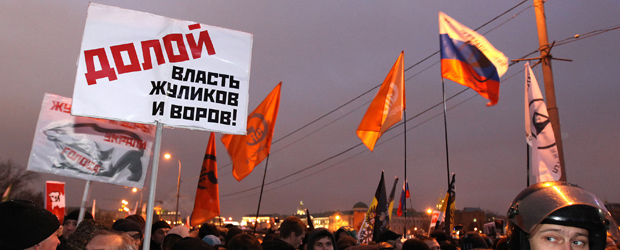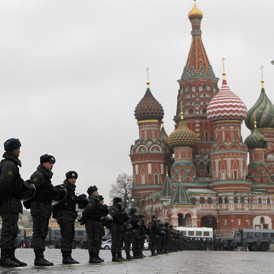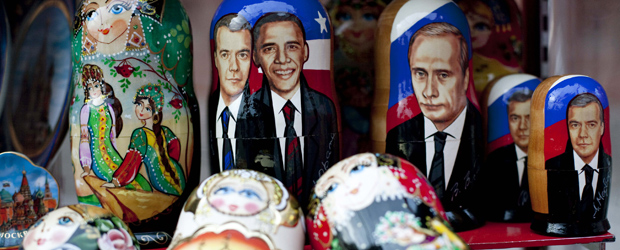Acting up? Russian civil society at 20 years old
Since the collapse of the Soviet Union, Russia has seen a vibrant civil society emerge, writes Human Rights Watch’s Caroll Bogert, former Newsweek Moscow bureau chief. But what does the future hold?

The street demonstrations sweeping Russia this month have defied the usual stereotypes about the passivity of the Russian people. Enraged by the results of a fraudulent parliamentary election, thousands of Russians have taken to the streets to register their disgust with Vladimir Putin’s ambitions to return in March as the country’s president. They seemed pleasantly surprised at their own numbers, and fervor.
“Thank you so much for not staying home on your couches and drinking beer!” one speaker at a Moscow protest told the crowd.
Thank you so much for not staying home on your couches and drinking beer! Speaker at a Moscow protest
In fact, civil society in Russia has been steadily growing in recent years and it is anything but passive. Before Communism collapsed twenty years ago this month, meeting in a private apartment to discuss anything faintly political could land the participants in prison or exile. Today, there are literally thousands of nongovernmental organizations (NGOs) sprinkled across the vast country. They work on a huge range of issues, from environmental campaigns to social work with the disabled; from fighting corruption to defending human rights.
The new growth spurt in Russian civil society occurred in the years after Putin handed the presidency over to Dmitri Medvedev. Now that he is preparing to return, many activists are wondering if they will be able to continue their work in the same way.
Read more: What does the future hold for Russia?
In 2006, Putin introduced a new NGO law designed to control independent groups – mostly by strangling them in kilometers of red tape. In the end, only a handful were forced out of business. But now, independent activism seems to represent a threat to Putin’s rule. He has returned to the familiar, and ominous, claim that his critics are funded by foreign enemies of the country.
Russian activists themselves have diverse views about cooperating with the authorities. Take Sergei Kovalev, a former political prisoner and the first human rights commissioner of Russia after the Soviet collapse twenty years ago. He insists that a truly robust civil society would challenge the current Russian government as thoroughly “illegitimate.” Instead, he complains, many activists are reduced to working in the margins and acting like “sly courtiers.”

To Marina Pisklakova, there is nothing marginal about her efforts to protect Russian women from domestic violence. Having established a series of protective homes for women fleeing abusive partners, she has just succeeded in setting up the country’s first toll-free telephone number to report such violence.
She’s deeply engaged with trying to induce the Russian parliament to make domestic violence a crime, so that women don’t have to pursue cases themselves.
“We are accepted by government agencies as an equal partner in responding to violence against women,” she says.
Some activists risk their lives to do their work. Investigators in Chechnya have been killed for their willingness to challenge Chechen authorities: first journalist Anna Politkovskaya, gunned down outside her Moscow apartment in 2006, then human rights activist Natasha Estemirova, abducted and murdered in Chechnya in 2009. Human rights lawyers and whistleblowers have been killed; one died in prison from abuse and possible criminal conduct by officials. The activists trying to prevent the destruction of the Khimki Forest outside Moscow have repeatedly been physically attacked, both by anonymous thugs and by local police. A local journalist, Mikhail Beketov, remains wheelchair-bound and unable to speak as a result of a vicious beating.
A photo gallery by Platon for Human Rights Watch on Russia's civil society
And when the threats aren’t mortal, they may be legal – designed to ruin the defendant’s reputation and finances. The head of Russia’s best-known human rights organization, Memorial, Oleg Orlov, is being sued by Chechen ruler Ramzan Kadyrov for criminal slander; he was acquitted earlier this year, but the case has been appealed. The journalist and gadfly Artem Troitsky, who has been issuing satirical barbs of the powerful since Soviet times, is current being sued by a Kremlin aide for calling him a “trained poodle.”
Civil society sometimes performs functions that the Russian government itself is sorely neglecting. Natalya Voronitsyna, a former photographer who is now bedridden with rapid-onset multiple sclerosis, ended up organizing firefighters during the terrible 2010 fires that beset western Russia. From her laptop in an apartment in a Moscow suburb, she dispatched volunteer firefighters, armed with their own supplies, to locations where local fire departments were proving ill-prepared and incompetent.
“The fires showed a lot of people that the government is impotent,” said Voronitsyna. “Only the people themselves can accomplish something.”

Ironically, most Russians know little about the activities of their own civil society. A handful of Russian newspapers are willing to criticize the Kremlin leadership, and to report the activities of human rights groups. One or two Moscow radio stations will do the same. But Russian television remains under tight control.
“The state-run TV channels are effectively the PR organs of the government,” says Leonid Parfenov, an independent-minded former TV personality who has been kept off TV news for the last seven years.
The good news is that Russia now has more active internet users than any country in Europe, and Putin does not control the news that people receive there. Among the many reasons that the ruling party won far fewer seats than expected in the parliamentary elections this month is the fact that the Kremlin no longer monopolizes the message.
Cyber freedoms are one genie that Putin will have a hard time stuffing back into a Soviet bottle.
Some of the big independent political websites went down during the parliamentary elections, raising fears that the Kremlin may not be as tolerant of cyber free speech in future. But mounting a full-scale effort to censor the internet would be extremely expensive – as the Chinese, for example, have found. Cyber freedoms are one genie that Putin will have a hard time stuffing back into a Soviet bottle.
Russian reformers have bemoaned the passivity of their people ever since the very first notions of reforming Russia at all.
“The government led the people by the hand and the people blindly followed its guide,” wrote historian Boris Chicherin in 1857.
“Throughout history, the government never encountered in the people serious obstacles.”
But as street demonstrations swept the country this month, it suddenly seemed that Vladimir Putin has possibly found, in his own people, a serious obstacle.
Carroll Bogert, deputy executive director of Human Rights Watch, is the former Moscow bureau chief for Newsweek magazine.